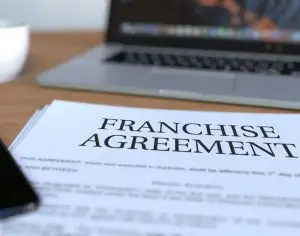A franchise resale is a win-win for everyone – the franchisor retains the franchisee, the business carries on thus providing continuity for customers, the seller or outgoing individual, who has built the business up, capitalises on their investment. And so we focus on building and growing our businesses but what happens if something doesn’t go to plan? What if the worst happens – a relationship breakdown, an illness, a death? What happens to your business then and what you, as a franchisee, can do now to protect your business?
There are two types of events that can occur in our business lives – external events that we have limited control over and internal events, those that we should be able to prevent or, at least, minimise the fallout.
Although some external events may be outside of our control, preparation is key. Whatever your business, there will be seasonal variations that you can plan for and prepare. Take weather for example. Whilst we may not be able to predict accurately when that heatwave may arrive but we can plan for it. Same with snow or flooding. Similarly with politics – both local and global. Will shortages in fuel affect your business? What about your supply chain and/or infrastructure?
Secondly, consider your business specifically – what are the key risks within your business? Is it equipment and systems failure or people or both to an extent? What can you put in place to minimise harm?
All of the above should be considered and documented as part of your business continuity plan but the key to an effective plan is testing. If you do not turn up to the office tomorrow or are not on the usual Monday zoom call, will your team know who to contact or what to do? Reviewing, updating, communicating and testing your plan is vital. If you are in a regulated sector, having a business continuity plan may be a regulatory requirement but if the plan is rarely tested then it will be ineffective in practice. Working through a business continuity plan may also be a good exercise for your teams – it is a good way to get them involved and thinking about the business!
But the biggest risk to your business is you. What happens in the event of serious illness or incapacity or, worst, death? Incapacity and death is not something we like to think about but this is something that every business owner should address. Consider in particular the following:
- Access to systems – are there any systems/information to which only you have access? Are these password protected?
- Bank account – if you are the sole signatory to the account what would happen if you were incapacitated or died? Can you appoint another signatory? Do you have an accountant or solicitor who could act as a signatory on your account? Their power can be limited and subject to conditions but this is a way to ensure that business can continue and payments can continue to be made such as to employees for example.
- Life Insurance or life assurance – it is worth exploring different products available.
- Franchise Agreement – there will be provisions within your franchise agreement dealing with death and incapacity. Are you familiar with these?
- Will & choice of executor – ultimately your business is your asset but as a franchised business, what you can do with your business will be subject to the terms and conditions of the franchise agreement (see above). You therefore need to ensure that your executor understands the fact that your business is a franchised business and you should choose your executor carefully to ensure that the value of your business can be preserved and maximised and that the conditions of the franchise agreement are adhered to. The executor will need to work with your franchisor!
If you are in the business with a business partner, and in particular if that is a spouse or relative then a shareholders agreement or a partnership agreement is essential. This is especially the case if your business partner is a silent partner! As tempting as it is to think that divorce or a relationship breakdown will not happen to us, it does happen even after years of happy co-existence! It is much easier to agree on exit options and share value calculations when the relationship is good than when it has broken down. Finally, a shareholders/partnership agreement needs to work within the scope of the franchise agreement; it needs to reflect the fact that your business is a franchised business so you will need to ensure that the solicitor that you engage to assist you with this has the knowledge and understanding of franchising.
As Benjamin Franklin said “nothing is certain except death and taxes”. We plan for taxes so let’s plan for death as in doing so we can protect the value of the business that we work so hard to build!


































